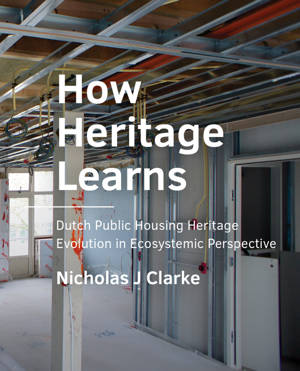
- Afhalen na 1 uur in een winkel met voorraad
- Gratis thuislevering in België vanaf € 30
- Ruim aanbod met 7 miljoen producten
- Afhalen na 1 uur in een winkel met voorraad
- Gratis thuislevering in België vanaf € 30
- Ruim aanbod met 7 miljoen producten
Zoeken
How Heritage Learns
Dutch Public Housing Heritage Evolution in Ecosystemic Perspective
Nicholas Clarke
€ 45,95
+ 91 punten
Omschrijving
How Heritage Learns explores the dynamics that come into play when public housing becomes valourised as heritage in the Netherlands and how that, in turn modulates the evolution of this protected housing. It builds on the foundation set by the thesis of Steward Brand, that buildings learn through the adaptation of their fabric to external forces: changing fashion, technologies and economy. This dissertation investigates different key drivers for change: Energy, Economy and Comfort (2E+Co).
To understand how and why the housing heritage evolved over time, an ecology of ideas is developed that sees buildings as organisms evolving and learning in their environments, providing a multi-sided theoretic model for analysis.
Three case studies are extensively explored: the Justus van Effen Quarter in Rotterdam (1921–22) and the King’s Wives of Landlust (1937–38) and Jeruzalem public housing complexes (1949–52), both in Amsterdam. These are all exemplary monuments of Dutch public housing and all three have undergone repeat renovations since their construction. The research not only highlighted their various learning cycles, but also uncovered exciting new information on their origins and histories.
What sets public housing heritage apart is the presence of a Story. However, the case studies reveal that the Stones were modulated by dominant 2E+Co ambitions common to all public housing. Above all, How Heritage Learns shows that past promises of increased performance and efficiency were never fulfilled. Without structured reflective observation we are doomed to repeat the same mistakes. Such lessons are all the more important at a time when the built environment stands at the cusp of another revolution driven by environmental imperatives.
To understand how and why the housing heritage evolved over time, an ecology of ideas is developed that sees buildings as organisms evolving and learning in their environments, providing a multi-sided theoretic model for analysis.
Three case studies are extensively explored: the Justus van Effen Quarter in Rotterdam (1921–22) and the King’s Wives of Landlust (1937–38) and Jeruzalem public housing complexes (1949–52), both in Amsterdam. These are all exemplary monuments of Dutch public housing and all three have undergone repeat renovations since their construction. The research not only highlighted their various learning cycles, but also uncovered exciting new information on their origins and histories.
What sets public housing heritage apart is the presence of a Story. However, the case studies reveal that the Stones were modulated by dominant 2E+Co ambitions common to all public housing. Above all, How Heritage Learns shows that past promises of increased performance and efficiency were never fulfilled. Without structured reflective observation we are doomed to repeat the same mistakes. Such lessons are all the more important at a time when the built environment stands at the cusp of another revolution driven by environmental imperatives.
Specificaties
Betrokkenen
- Auteur(s):
- Uitgeverij:
Inhoud
- Aantal bladzijden:
- 554
- Taal:
- Engels
- Reeks:
Eigenschappen
- Productcode (EAN):
- 9789463664387
- Verschijningsdatum:
- 25/06/2021
- Uitvoering:
- Paperback
- Afmetingen:
- 191 mm x 235 mm
- Gewicht:
- 1269 g

Alleen bij Standaard Boekhandel
+ 91 punten op je klantenkaart van Standaard Boekhandel
Beoordelingen
We publiceren alleen reviews die voldoen aan de voorwaarden voor reviews. Bekijk onze voorwaarden voor reviews.











